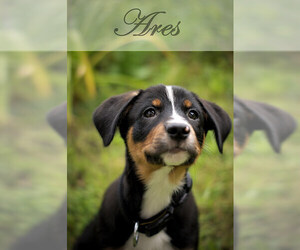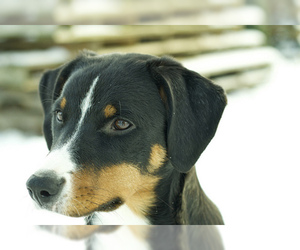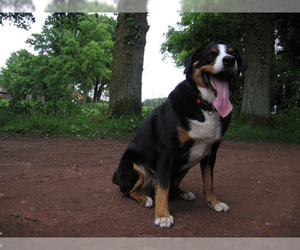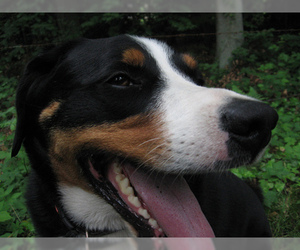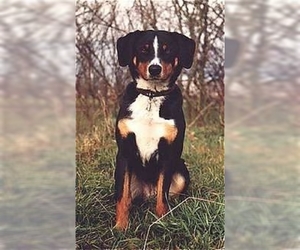
All about Appenzeller Sennenhund dog breed
A.K.A. :Appenzeller Mountain Dog, Appenzell Cattle Dog, Appenzeller, Appenzell Dog, Appenzeller Shorthaired Mountain Dog, Appi
Size
Grooming requirements
Exercise requirements
Good with other dogs
Watchdog ability
Energetic
Training requirements
Playful
Affectionate
Good with other pets
Good with children
Good with strangers
Winter
Summer
Healthiness
Protective
Life Span
| Pure Breeds | Member |
| Breeds A - Z | A |
| Breeds by Group | Herding Working |
| Breeds by Trait | Good With Kids High Stamina Dog Breeds Smartest Dog Breeds |
| Overview: | The Appenzeller Sennenhund, often called the Appenzeller Mountain Dog, hails from the Appenzell region of Switzerland, where it was originally bred as a versatile farm dog for herding, guarding, and driving livestock. This medium-sized breed is instantly recognizable by its striking tricolor coat – typically black with rust and white markings – and its distinctive, curled "posthorn" tail carried over its back. Physically robust and muscular, Appenzellers possess a lively and intelligent temperament, making them highly trainable but also requiring consistent mental and physical stimulation. They are loyal and protective of their families, generally good with children when properly socialized, though their high energy levels make them less suitable for small apartments and ideally suited for homes with yards. While generally healthy, potential owners should be aware of possible predispositions to hip and elbow dysplasia. With proper exercise and training, the Appenzeller Sennenhund makes an excellent, devoted companion for an active family. |
F.A.Q.
All You Need to Know About the Appenzeller Sennenhund BreedThe Appenzeller Sennenhund, a medium-sized, tri-color working dog from the Swiss Alps, is known for its energetic and intelligent nature. Originating as a farm dog, their loyal and protective temperament makes them excellent family companions, though early socialization and training are crucial. Physically, they boast a strong, muscular build with a distinctive, tightly curled tail and a short, dense coat. While their intelligence makes them highly trainable, their need for mental stimulation and ample exercise means they are not suited for apartment living. They thrive in homes with yards and active owners who can provide daily walks, playtime, and perhaps even dog sports. Grooming is relatively low-maintenance, requiring only weekly brushing to manage shedding. Health-wise, the Appenzeller Sennenhund is generally robust, but potential owners should be aware of breed-specific concerns such as hip and elbow dysplasia. They are a truly rewarding breed for the right active family.
Appenzeller Sennenhund Weight: Adult Appenzeller Sennenhund typically weigh between 48 to 70 pounds. Males are generally heavier, ranging from 55-70 lbs, while females are usually 48-60 lbs. This healthy weight for Appenzeller Sennenhund reflects their robust and muscular build. When considering an Appenzeller Sennenhund, understanding their average size is key for proper care and exercise.
Here's what you need to know about the Appenzeller Sennenhund height and average size:The average height of an Appenzeller Sennenhund is typically between 19 and 22 inches (48-56 cm) when measured at the shoulder. This sturdy and agile breed falls into a medium-large size category.You'll find some slight variation within this range:* Males are generally at the taller end of the spectrum, usually ranging from 20 to 22 inches (52-56 cm) at the shoulder.* Females tend to be a little more compact, typically measuring between 19 and 20.5 inches (48-52 cm) at the shoulder.It's important to remember that individual Appenzeller Sennenhund height can also be influenced by genetics and nutrition. A well-bred Appenzeller from a reputable breeder should fall within these standard ranges. If you're wondering how tall is a Appenzeller Sennenhund, this guide provides a clear picture of their typical adult dimensions, which is helpful when comparing breeds for your lifestyle.
The Appenzeller Sennenhund coat is striking and easily identifiable. Appenzeller Sennenhund colors are tricolor, a distinct pattern featuring black as the dominant base, accented with rust-brown (tan) markings and white symmetrical markings.AKC recognized Appenzeller Sennenhund colors strictly adhere to this tricolor pattern:* Black with rust-brown (tan) and white markings.The rust-brown markings are typically found above the eyes, on the cheeks, chest, and legs. White markings are usually on the blaze, muzzle, throat, chest, feet, and tail tip. A white blaze extending from the forehead to the muzzle and a white cross on the chest are highly desirable.There are no rare coat types or exotic Appenzeller Sennenhund variations accepted by major kennel clubs like the AKC. Blue, lilac, merle, chocolate, brindle, fawn, cream, or solid white Appenzeller Sennenhunds are not recognized and indicate either a misidentification of the breed, a mixed-breed dog, or a genetic fault that would disqualify them from conformation events and ethical breeding. Potential adopters should be cautious of breeders offering such non-standard colors, as these often come with inflated prices and may indicate irresponsible breeding practices. Focus on the classic, well-established tricolor pattern for a true Appenzeller Sennenhund.
The Appenzeller Sennenhund personality is generally known for being lively, self-assured, and courageous. They are exceptionally loyal and friendly with their families, often forming strong bonds. Their temperament of Appenzeller Sennenhund with strangers can be reserved initially, but they are rarely aggressive, displaying a watchful nature. These intelligent dogs are highly sociable and thrive on companionship, benefiting from consistent training and early socialization. While energetic outdoors, they can be adaptable to apartment living if provided with sufficient daily exercise and mental stimulation. They are typically good with children they're raised with, acting as playful and protective companions, though supervision is always recommended. With proper introduction and socialization, they can also get along well with other pets. Owners should be prepared for their strong herding instincts and ensure they have an outlet for their energy.
The Appenzeller Sennenhund temperament is renowned for being lively, confident, and highly intelligent. They are exceptionally loyal and devoted companions, forming strong bonds with their families. Generally friendly and sociable with familiar faces, they can be reserved with strangers, making early socialization crucial.
Their natural watchfulness means they are excellent, albeit vocal, guard dogs, prone to barking to alert their owners. Appenzellers are highly trainable due to their eagerness to please, though they can exhibit a tendency toward stubbornness if not engaged consistently. They thrive on activity and mental stimulation, making them less suitable for apartment living unless provided ample daily exercise and outdoor adventures. With children, they are typically patient and playful, especially when raised together, but their energy levels might be overwhelming for very young children. They can coexist well with other pets if properly introduced and socialized from a young age, though their strong herding instinct might lead them to "herd" smaller animals. They are generally not sensitive, but respond best to positive reinforcement training methods.Appenzeller Sennenhund Care: Your Daily Maintenance GuideHow to care for an Appenzeller Sennenhund? This active, intelligent breed requires consistent care to thrive. Appenzeller Sennenhund care focuses on their well-being, from grooming to health.Grooming Needs: Appenzellers have a dense, double coat that sheds moderately year-round, with heavier seasonal shedding. Weekly brushing with a slicker brush and undercoat rake is essential to remove loose hair, prevent matting, and maintain coat health. Regular nail trims (every 2-4 weeks) and occasional bathing (as needed, typically every 2-3 months) are also part of their routine.Exercise Limitations & Needs: Despite their sturdy build, Appenzellers are not a low-energy dog breed. They require significant daily exercise – at least 60-90 minutes of vigorous activity. This can include long walks, hiking, jogging, or engaging in dog sports like agility or obedience. Mental stimulation through puzzle toys and training sessions is equally important to prevent boredom and destructive behaviors. While not brachycephalic, they can overheat in extreme weather, so avoid strenuous exercise during the hottest parts of the day.Dietary Considerations: Feed a high-quality, age-appropriate dog food formulated for medium to large breeds. Monitor calorie intake and feed according to activity level to prevent obesity. Consult your veterinarian for specific dietary recommendations and portion control.Wrinkle and Ear Cleaning: Appenzellers typically do not have deep facial wrinkles requiring special cleaning. However, their ears should be checked weekly for dirt, debris, or signs of infection. Clean with a veterinarian-approved ear cleaner as needed.Climate Sensitivity: While not truly brachycephalic, Appenzellers have a thick double coat that makes them susceptible to overheating in hot, humid climates. Provide ample shade and fresh water during warm weather, and avoid strenuous exercise during peak heat. They tolerate colder climates well.Common Health Concerns & Health Tips for Appenzeller Sennenhund:* Skin Issues: Due to their dense coat, they can be prone to skin allergies or hot spots if not properly groomed. Regular brushing and checking for irritation are key.* Dental Care: Daily dental hygiene, including brushing their teeth, is crucial to prevent periodontal disease. Regular professional dental cleanings may also be recommended.* Weight Management: Appenzellers can be prone to weight gain if overfed or under-exercised, leading to other health issues. Closely monitor their weight and activity.* Joint Issues: Like many active breeds, they can be predisposed to hip and elbow dysplasia. Maintaining a healthy weight and providing appropriate exercise can help mitigate these risks.By following these guidelines, you can ensure your Appenzeller Sennenhund enjoys a long, healthy, and happy life.
Appenzeller Sennenhund Activity Level: Moderately ActiveThe Appenzeller Sennenhund possesses a moderately active energy level, making them an engaging companion without being overly demanding. They are not high-strung, but definitely not couch potatoes either. Appenzeller Sennenhund activity level can be characterized by their preference for short bursts of energetic activity followed by periods of rest.Exercise Needs: To meet their exercise needs, Appenzellers require a minimum of 60-90 minutes of dedicated activity daily. This should include brisk walks, jogging, or off-leash play in a secure area. They thrive on mental stimulation as well, enjoying activities like obedience training, agility, or puzzle toys that challenge their intelligent minds. Their herding instincts mean they enjoy having a "job" to do, whether it's fetching, accompanying you on hikes, or even participating in dog sports.Playtime Preferences: These dogs love to play! They enjoy interactive games like fetch, tug-of-war, and hide-and-seek. They are typically good with children and other animals when properly socialized, making them excellent family dogs who enjoy being involved in family activities.Limitations: It's important to note that while the Appenzeller Sennenhund is a sturdy breed, they are not brachycephalic. This means they generally do not suffer from the same respiratory limitations as truly brachycephalic breeds (like Pugs or Bulldogs) and can tolerate moderate exercise in most weather conditions. However, like any dog, they can overheat in extreme temperatures, so always monitor them during hot weather and ensure access to fresh water and shade. Their thick double coat can also contribute to overheating in hot, humid climates.Suitability: So, how active are Appenzeller Sennenhund? They are a good fit for active families who enjoy outdoor activities and are prepared to provide consistent exercise and mental engagement. While they appreciate downtime and cuddling, they are not suitable for entirely low-energy households that cannot commit to their daily activity requirements. They are a wonderful choice for those seeking a loyal, intelligent, and moderately active companion who enjoys both adventure and quiet time at home.
To understand how to keep Appenzeller Sennenhund healthy, owners should maintain a lean body weight to reduce strain on hips and spine, provide regular but moderate exercise suited to their herding stamina, and avoid strenuous activity in hot weather. Grooming routines should include brushing to manage shedding and prevent skin irritation, ear cleaning to reduce infection risk, and dental care to prevent periodontal disease. Allergy management may require dietary adjustments or veterinary guidance, while routine veterinary checkups are essential for monitoring orthopedic health, spinal stability, thyroid balance, and eye conditions such as progressive retinal atrophy (PRA).
In addition to these concerns, Appenzeller Sennenhunds may inherit breed-specific risks such as epilepsy, cataracts, and hypothyroidism. Preventive screenings, responsible breeding, and consistent veterinary monitoring are key to minimizing these risks and supporting long-term wellness. With proactive care, adopters and buyers can ensure this loyal, intelligent, and energetic working dog remains strong, healthy, and happy throughout its life.
Breed Breakdown: What Experts Say About the Appenzeller Sennenhund
I'd rate the "Size" trait of the Appenzeller Sennenhund a 7.This rating places them firmly in the medium-to-large category. While not a giant breed, their sturdy, muscular build and average height of 19-22 inches (males) and 18-21 inches (females) at the shoulder, coupled with weights typically ranging from 50-70 pounds, mean they command a significant physical presence. They are considerably larger than many popular companion breeds like Beagles or French Bulldogs, and their dense bone structure contributes to their overall substantial feel.Due to their size and energetic nature, Appenzeller Sennenhunds are generally not best suited for apartment living. While they could potentially adapt with a very dedicated owner providing extensive daily exercise outdoors, their strong desire for movement and space would make a small living environment challenging for both the dog and the owner. They are better suited for households with ample space, ideally with a securely fenced yard where they can explore and play. Their size can also be a consideration for travel, as they will require a large crate and may not fit comfortably in the cabin of most aircraft, necessitating cargo travel which can be stressful.
I would rate the grooming requirements of the Appenzeller Sennenhund at a 3 out of 10.This breed is generally very low-maintenance when it comes to grooming. Their short, dense double coat sheds moderately year-round, with heavier shedding twice a year during seasonal changes. Regular brushing once or twice a week is usually sufficient to remove loose hair and keep their coat healthy, increasing to a few times a week during peak shedding. They don't typically have skin folds that require special cleaning, and their ears, while needing occasional checks for cleanliness to prevent infections, aren't prone to excessive wax buildup. Nail trimming should be done regularly, like most dogs, but isn't particularly demanding. Bathing is only necessary when they get dirty, as over-bathing can strip natural oils from their coat. They are not known for being exceptionally susceptible to skin issues or allergies, making their overall coat and skin care straightforward compared to many other companion dogs.
I'd rate the Appenzeller Sennenhund's exercise requirements as an 8.This breed possesses a high energy level and a strong working drive, making sustained activity a necessity for both their physical and mental well-being. They are not a "lounge around" dog and will become bored and potentially destructive without adequate outlets. Daily activity should include more than just casual walks; they thrive on structured routines that incorporate brisk, extended walks, jogging, hiking, and vigorous playtime. Their robust build and excellent stamina allow them to tolerate sustained movement very well. While not brachycephalic, meaning they don't have the respiratory limitations of breeds like pugs, their thick double coat can make them more susceptible to overheating in extreme weather, so exercise should be adjusted accordingly. Appenzellers excel in activities like agility, obedience, herding, and even canicross, demonstrating their suitability for a variety of physically demanding and mentally stimulating tasks. They require consistent, purposeful exercise to prevent restlessness and to maintain their muscular physique and sharp intellect; a minimal activity lifestyle would lead to an unhealthy and unhappy dog.
I would rate the Appenzeller Sennenhund's "Watchdog Ability" at an 8.The Appenzeller Sennenhund is a naturally alert and vocal breed with strong territorial instincts. They are quick to notice anything out of the ordinary, whether it's an unfamiliar sound, person, or animal approaching their property. Their barking behavior is typically purposeful and sustained, serving as a clear warning to both their owners and potential intruders. While not inherently aggressive, their size, powerful bark, and confident demeanor are usually enough to deter most unwelcome visitors. They are highly attuned to their surroundings and will reliably provide meaningful early warnings in a home environment, making them far from a passive companion in this regard. Their protective instincts are firmly rooted in their heritage as farm dogs, where they were expected to guard livestock and property.
Rating: 7The Appenzeller Sennenhund generally rates a 7 for "Good with Other Dogs." They are typically known for being quite amenable and friendly with other canines, especially when well-socialized from a young age. Their natural herding instincts, while sometimes manifesting as a desire to "herd" other dogs, usually doesn't translate into aggression. They tend to be compatible with dogs of various sizes and energy levels, often adapting well to play and interaction.However, a rating of 7, rather than a perfect 10, acknowledges a few nuances. Like many strong-willed working breeds, inadequate socialization can lead to apprehension or territoriality around unfamiliar dogs, particularly if they perceive another dog as a threat to their "pack" (their human family). While not inherently aggressive, a lack of appropriate early experiences could manifest as an overly dominant posture or an unwillingness to share resources with new dogs. In multi-dog households, they often thrive, becoming loyal companions to their canine housemates, but careful introductions and consistent training are still beneficial to ensure peaceful coexistence, particularly with high-value items or within established hierarchies. With proper guidance, an Appenzeller is a highly sociable dog that enjoys canine company, but their strong personality means they aren't always automatically accepting without some foundational work.
I would rate the Appenzeller Sennenhund's "Energetic" trait as an 8 out of 10.The Appenzeller Sennenhund is a naturally active and robust working breed, definitely not laid-back compared to many other companion dogs. They possess a high typical activity level, demonstrating excellent endurance and a strong desire to be involved in activities. Their playfulness is notable, and they have a significant need for physical and mental stimulation to prevent boredom and destructive behaviors. This breed is well-suited for a variety of outdoor and athletic activities, thriving on long walks, hikes, agility, herding, and other dog sports. Their historical role as herding and droving dogs instilled in them a resilient and energetic temperament.It's important to note, however, that while energetic, the Appenzeller Sennenhund is *not* brachycephalic. They have a well-proportioned muzzle, which means their anatomy does not inherently affect their stamina and exercise tolerance in the way it would for a brachycephalic breed (like a Bulldog or Pug). Therefore, their high energy levels can typically be met without concerns related to breathing difficulties during exercise, allowing them to fully engage in the vigorous activities they enjoy.
I would rate the training requirements of the Appenzeller Sennenhund at a 7.While intelligent and capable of learning a great deal, the Appenzeller possesses an independent and strong-willed nature that can manifest as stubbornness. They are not a breed that will blindly follow commands without understanding the "why" or if they're not adequately motivated. Their attention span can be good when engaged, but they can also become easily bored or distracted if training isn't stimulating or varied. Responsiveness to commands will be high with consistent, clear, and positive reinforcement, but a lapse in routine or expectation will quickly be exploited. They absolutely *require* consistency from their owner and will test boundaries regularly. Positive reinforcement is highly effective, as they thrive on praise and rewards, but harsh methods will backfire and damage the bond. This breed is generally not beginner-friendly and requires an experienced handler who understands dog behavior, is patient yet firm, and is prepared to implement structured routines from a young age. Early socialization and consistent, positive training are paramount to prevent undesirable behaviors and harness their potential as a well-behaved companion.
I'd rate the Appenzeller Sennenhund's "Playful" trait a 7 out of 10.Appenzellers are certainly not inactive; they possess a strong working dog heritage that translates into a naturally spirited and energetic disposition. They absolutely love games and interaction, thriving on engaging activities with their families. You'll find them responsive to toys and readily enthusiastic during playtime, often instigating games themselves. Their attention-seeking behavior is usually expressed through an eagerness to participate in whatever you're doing, and they enjoy being at the center of the action. While they aren't the constantly-bouncing-off-the-walls type like some terrier breeds, their overall enthusiasm in daily life is high, especially when it involves outdoor adventures or mental stimulation. They are more spirited than laid-back compared to many other companion dogs, requiring a good outlet for their energy and a family willing to engage them in playful activities.
I'd rate the "Affectionate" trait of the Appenzeller Sennenhund a 9 out of 10.Appenzellers are renowned for their deep devotion and strong desire for human companionship. They are very much "velcro" dogs, often following their family members from room to room, and they thrive on being an integral part of their human's life. While not necessarily persistent lap-sitters as adults due to their size and energy, they crave physical closeness and are content to lean against you or lie at your feet. Their loyalty is unwavering, and they are quite sensitive to their owner's moods, often offering comfort or mirroring the family's emotional state. They truly blossom when they receive consistent affection and engagement, making them less independent and more people-oriented compared to some other companion breeds.
I would rate the "Good with Other Pets" trait of the Appenzeller Sennenhund a 7 out of 10.Appenzellers generally possess a good nature and are often amiable with other animals, especially when raised with them from a young age. Their herding background means they can sometimes try to "herd" smaller, quicker pets, but this is usually more playful than aggressive. They typically get along well with other dogs, enjoying canine companionship. However, they do have a moderate prey drive due to their working origins, which can manifest as an interest in chasing cats or other small, fast-moving animals if not properly socialized and trained. Resource guarding is not a prominent breed-wide issue, but like any dog, early training and management are crucial. They are adaptable to multi-pet households, but their energetic nature means that early and consistent socialization, along with clear boundaries and supervision, are essential to ensure peaceful coexistence with cats and other smaller pets. They are not naturally born to be subservient to other animals, and without proper guidance, their herding instincts and prey drive could lead to less than ideal interactions.
The Appenzeller Sennenhund rates a 7 out of 10 for "Good with Children."This breed is generally known for its loyalty and protective nature towards its family, which often extends to children. They can be very playful and energetic, enjoying activities with kids who are old enough to engage respectfully. Their intelligence means they can be trained to interact appropriately, and they are typically patient. However, they are also a herding breed with a strong personality and sometimes a tendency to "herd" smaller children, which can be playful but might be too boisterous for very young or fragile children without supervision. They are generally tolerant of noise and handling, especially if socialized well from a young age. While they are naturally affectionate with their family, their high energy and potential for bossiness mean that consistent training and adult supervision are important to ensure a harmonious environment, especially with toddlers or very active children. They are not a "set it and forget it" breed with kids but can be wonderful companions with proper guidance.
I'd rate the "Good with Strangers" trait of the Appenzeller Sennenhund a 6 out of 10.While not inherently unfriendly, the Appenzeller is a robust and watchful breed, originally developed for herding and guarding. This means they possess a natural wariness around unfamiliar individuals. They aren't typically the type to immediately solicit attention from strangers; instead, they tend to observe first. With proper early and ongoing socialization, an Appenzeller can become polite and accepting of new people, potentially even enjoying calm interactions. However, without this dedicated effort, their protective instincts can lean towards aloofness or even suspicion, leading to barking or a more reserved, watchful stance. They generally require training and exposure to be comfortably adaptable in busy public settings or around many guests, rather than being naturally outgoing in such situations. They are more likely to be welcoming once they perceive a stranger as being "approved" by their owner.
The Appenzeller Sennenhund would rate a 7 for winter tolerance.This breed possesses a dense double coat that provides good insulation against cold, and their muscular build and moderate size contribute to their ability to generate and retain body heat. They are active dogs that generally enjoy being outdoors, even in cooler temperatures. While they are not as heavily coated or massive as some true "northern" breeds, they are certainly more resilient to cold than short-haired or toy breeds. They are not brachycephalic, which eliminates a significant respiratory vulnerability in cold weather.However, a rating of 7, rather than a perfect 10, acknowledges that while they are well-equipped for cold, they aren't impervious to extreme conditions. In very harsh, prolonged sub-zero temperatures, or during periods of inactivity in the cold, they would still benefit from and may require some additional consideration compared to, say, a Siberian Husky. They might appreciate a warm bed indoors after a long cold outing, and shouldn't be left unattended outdoors for extended periods in blizzards or extreme cold. Compared to many other companion dogs, they are quite hardy and capable of enjoying winter activities without extensive special care, but vigilance for signs of discomfort or hypothermia is always wise in very severe weather.
I would rate the Appenzeller Sennenhund's "Summer" tolerance at a 4.While not as severely brachycephalic as some breeds, Appenzellers do have a somewhat shorter muzzle compared to their longer-nosed counterparts, which can slightly impede efficient heat exchange. Their dense double coat, designed for protection in colder Swiss climates, is a significant disadvantage in high temperatures. This coat insulates well, trapping heat close to the body and making it difficult for them to cool down through panting alone. Consequently, they are at a higher risk of heatstroke, especially during vigorous activity or prolonged exposure to direct sunlight. They require significant modifications to their routine during summer months, including restricted outdoor activity to cooler times of the day (early morning or late evening), access to shade and fresh water at all times, and often need access to air-conditioned environments during the' hottest parts of the day. Compared to many other companion dogs, Appenzellers definitely require more special care and vigilance to prevent overheating in summer.
I would rate the Appenzeller Sennenhund's "Healthiness" trait as a 7 out of 10.Appenzellers are generally considered a robust and healthy breed with a good life expectancy of 12-14 years, which is quite respectable for a medium-large dog. They don't typically suffer from the extreme conformational issues that lead to breathing difficulties in brachycephalic breeds, nor do they often present with the widespread skin problems seen in some other breeds.However, like many large breeds, they are genetically predisposed to certain orthopedic issues, most notably hip and elbow dysplasia. These are common concerns across many similar breeds, and responsible breeders will screen their dogs to minimize the incidence. Eye conditions like progressive retinal atrophy can also occur, though less frequently. Bloat (gastric dilatation-volvulus) is another risk factor for deep-chested dogs, including the Appenzeller, and owners should be aware of the signs.While not considered exceptionally delicate or high-maintenance, their potential for joint issues means they benefit from good nutrition, appropriate exercise, and preventive care throughout their lives. They are certainly more robust than breeds known for a plethora of genetic health woes, but not quite as bulletproof as some truly ancient or less domesticated landrace breeds. Their overall health is good, but potential owners should be mindful of theeritable conditions and seek out reputable breeders who prioritize health testing.
I would rate the "Protective" trait of the Appenzeller Sennenhund at a 7 out of 10.Appenzellers are inherently alert and observant, stemming from their herding and farm dog origins. They possess strong territorial instincts and are quick to notice anything out of the ordinary, making them excellent watchdogs. Their loyalty to their owners is unwavering, and they will instinctively place themselves between their family and a perceived threat. While they are generally reserved with strangers, they are not typically aggressive without cause; however, their imposing bark and confident demeanor can be a significant deterrent. They are more of a companion dog with strong protective instincts, rather than a dedicated guard dog trained for attack. They are highly capable of offering meaningful protection in a household setting through their warning barks, physical presence, and willingness to defend their family, but their primary protective mechanism is typically alerting and deterring rather than direct physical confrontation, though they are certainly capable if pushed.
I would rate the "Life Span" trait of the Appenzeller Sennenhund a 7 out of 10.Appenzeller Sennenhunds are generally considered a long-lived breed compared to many other medium-to-large companion dogs. Their average life expectancy typically ranges from 10 to 14 years, which is quite good for their size. While they are prone to some health issues like hip and elbow dysplasia, progressive retinal atrophy, and occasionally bloat, these are often manageable with responsible breeding practices, proper veterinary care, and a healthy lifestyle. Dedicated breeders actively screen for these conditions, and a well-cared-for Appenzeller, with adequate exercise, a balanced diet, and regular vet check-ups, often enjoys a full and healthy life. They aren't in the exceptional longevity category of some smaller breeds, but they are certainly above average.
Appenzeller Sennenhund Dogs for adoptionSee all dogs for adoption
Similar Dog Breeds for Appenzeller Sennenhund
Quick Breed Selector 0 - not important, 1 - smallest, 10 - largest
Variants & Mistakes :Appenzeller Sennen Hund, Appenzeller Sennenhuund, Appenzeller Sennunhund, Appenzeller Senenhund, Appenzeller Sennenund, Appenzeller Sennehund, Appenzeller Sennhenhund, Appenzeller Sennnhund, Appenzeller Sennnehund, Appenzeler Sennenhund, Appenzeller Sennanhund, Apenezeller Sennenhund, Appenzeller Sennen-hund, Appenzeller Sennen h, Apennzeller Sennenhund, Apenseller Sennenhund, Appenzeller Sennen, Appenzeller Senenund, Appenzeller Sennenhun, Appenzeller Sennenh, Appenzeller Sennenhundt, Apenceller Sennenhund, Appenzeller Sennenhound, Appenzeller Sennonhund, Appenzeller Sennenhundd, Appenzeller Senne hund, Apenzeller Sennenhund
